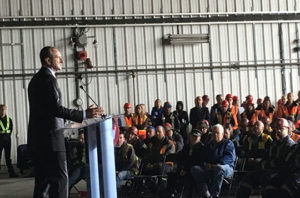Camosun College recently received a $300,000 grant from the Dennis and Phyllis Washington Foundation to go towards funding for women in trades at Camosun. In particular, the money will be put towards Camosun’s Women in Trades Training Program and the new STEP Up for Women Initiative.
According to Angus Matthews, director of the TRADEmark of Excellence Campaign (a campaign within Camosun dedicated to raising financial support to aid the growth of trade programs) Camosun is aiming to increase the number of women in trades programs to 500 by 2020. Matthews says there are currently 144 women enrolled in trades at Camosun.
“Across the college, we’re virtually perfectly gender balanced; it’s quite amazing, actually,” he says. “However, trades is only four percent women, and that’s perhaps not unexpected with the workforce arrangements for trades, but it’s obviously something that’s rapidly changing.”

Matthews says “about a third” of the money will go towards “additional bursaries and support for women entering trades,” while the rest will be used for career counselling, job placement, and cultivation of a mentoring program that will consist of trades graduates and female executives and leaders who are working in the trades and construction businesses.
“We want to put together a whole mentoring group for women in trades,” says Matthews. “The fund will also help us attract more female instructors in trades. Camosun also comes up really short in that regard; we have one female instructor. But that, again, is a symptom of the trades in general.”
Matthews says that instructors have “not only completed a formal education” but also often have a number of years of experience working in their chosen trades. Matthews points out that if you take the example of a woman working in the trades now and trace her career timeline backwards, by the time she completed her education, got her Red Seal, and worked for 10 or 15 years, that’s going back into “an era where women were almost unheard of in trades.”
“We’re lagging behind, not because of any carelessness, or lack of desire to balance it from the college’s point of view, but just simply the reality of the workplace,” says Matthews. “So this is all part of changing it.”
Matthews says it is “absolutely essential” more students come into the trades. He says that in 2014, only 1 in 85 students coming out of high school selected the trades.
“That needs to change,” says Matthews. “And the way it needs to change is by getting more underrepresented groups included in the trades, be it indigenous students or women or population sectors that are poorly represented in the trades.”
Matthews says it is imperative now more than ever for companies to find more workers, and find good workers.
“They need to cast the net wider, and certainly reaching out to women was a very obvious thing. So it’s very much market-driven, not just socially important,” he says.
The investment—which totalled $2.9 million and was split up between Camosun, BCIT, and UBC—puts Camosun’s campaign at $3.6 million, just $1.4 million away from their goal of $5 million, according to Matthews, who is confident the goal will be met by the fall. And to him, the donations represent a possibility for change.
“I always tell donors,” he says, “‘Do we want the college to be as good as the government can make it, or as good as the community can make it?’”
